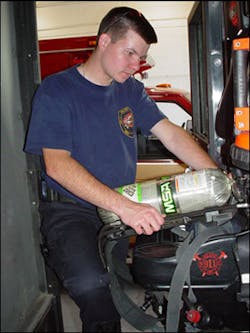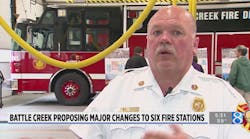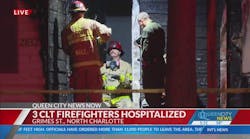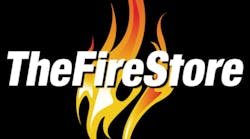Each year we continue to lose an average of 100 firefighters in the line of duty. Looking at statistics from the past 30 years, there has been little improvement in this area with the exception of the implementation of NFPA 1500 in 1985 that brought the numbers down to 100 from a range of 120 - 130 annually. Looking closer at these statistics, we would realize that we as a fire service are just not learning from our mistakes overall. History continues to repeat itself. The leading causes of LODDs continue to be from vehicle accidents and cardiac related events. Outside of these two reasons, according to NIOSH case studies conducted after firefighter fatalities, the most common threads listed as contributing factors to firefighter LODDs are;
- Breakdowns in the Incident Management System
- Lack of or inadequate standard operating procedures
- Breakdowns of accountability systems on the fireground
- Breakdowns in fireground communication
- Lack of recognition of key aspects related to fire behavior and building construction
The most disturbing point of these common threads is that they all can be controlled or prevented to a degree with proper action being taken prior to an incident.
These factors are not the sole reasons however. Other contributing factors that play into the game are factors in which we have little or limited control. Such things as the fact that the number of working fires has diminished over the 30 year time period (this clearly identifies the real score of the game since fires are decreasing and our LODDs are remaining roughly the same). Diminished fires are definitely a very positive note for everyone.
The down side to this however is that the actual street level experience of the fire service has diminished also. With time, we have lost many of the more experienced members of our departments that worked in the busy era to retirement, leaving us with a gap possibly creating an inability to recognize things on the fireground that only comes with experience as well as ineffective command presence due to a lack of confidence from not having the required experience. On the job mentoring as well as solid hands on training in practical scenarios are required to help us overcome this pitfall and should be set as a high priority for every department's training program.
As a fire service, our training must be taken to the next level. Unfortunately in 2006, we were still basing our training programs and fireground tactics on principals that are now outdated for the most part. Most of the principles that we train on were developed during a period of time where most goods were fabricated of natural materials such as cotton, wood, leather, wool etc. In today's world, goods made of plastics and other synthetic materials have overtaken our lives leaving firefighters facing fires that burn both hotter and more rapid than in the past.
The equipment that protects us can be considered a factor that works against us if we do not train with it and fully understand its capabilities and limitations. The protective qualities of gear can allow firefighters to penetrate into fires and high heat situations too deep and can greatly increase the chances of heat stress if not understood.
Knowledge of construction features as well as what "secrets" are contained within the buildings in our response areas remains paramount for us to have the ability to take the proper actions on the fireground. What this means is that we need to get out and look at these buildings while they are "undressed" during the construction or renovation stage. Company inspections or preplanning offer great opportunities for us in this regard but are not necessary to accomplish this goal. Taking a few moments to look at things after a false alarm activation or medical run prove to be invaluable at 3 A.M. when smoke is banked down to the floor level in that same building.
One of the biggest obstacles that we have to overcome as a fire service though, is the concept of attitude that is exhibited both towards the profession and each other. Attitude is truly the "crayon that colors our world" and has a great effect on firefighter safety on the fireground. The fire service by far is the greatest profession to be involved in but we have to remember, it is a serious business that requires serious people.
Each and every call should be approached as if it is the "real deal". Complacency should have no room in our vocabulary; firefighters should be equipped with tools and be wearing their equipment properly each and every time that they get off a rig on a call. Although our departments share some responsibility in the training and well being of their members, the ultimate responsibility of knowing your equipment and job is the responsibility of ourselves - we wanted this job, why should someone else have to hold our hands when it comes to checking our equipment or performing our job, especially when it comes to our own personal safety. As a fire service, we need to continually raise the level of our performance and force the "non-doers" to meet higher expectations. Quite frankly, nobody forced anyone to take the oath that we take when entering the fire service and nothing short of excellence is expected and deserved by both the public who we serve and the firefighters we serve with.
Courage, pride, integrity, commitment and determination should always remain the values that stand for the fire service. The term "brotherhood", is often used in the fire service to describe our professional bond. Do we really treat one another the way that this term implies? Our actions beyond a doubt, do speak louder than words.
Training ideas and concepts must always be freely exchanged and passed along. No instructor can say that they "own" them; they are the principles of firefighting. Credit should always be rightfully passed along though in the proper manner when deserved. If an individual feels otherwise, maybe they need to ask if they believe in what they claim and maybe reconsider their involvement in the fire service. These statements are not meant to be "soap box" statements but rather realities that we must face in our profession to ensure that we are committed to decreasing the number of LODD fatalities and achieving the expected level of excellence.
Openness to new concepts and ideas must exist to keep up with the world that we live in and we must never give up in our quest to improve ourselves as a fire service. The most dangerous individual on any fire department is the individual that says that they do not need to train in an area because they know it or have been on the job for a certain amount of time. Basic skills in areas such as SCBA, fire behavior, self survival and building construction should never be taken for granted. If we can not effectively grasp these basic areas, how can we really expect to perform when an advanced level of skills is required? We have to start learning from the past. Our job will always contain danger no matter how hard we try to control it but why should we continue to ignore the factors that we can control? We can start by taking control and exhibiting responsibility for ourselves. Make certain that you wear your seatbelt at all times, workout, eat healthy and make the effort to know and learn the job each and every day. Are you prepared to meet the challenge if it comes during your shift?
Jeffrey Pindelski is a 16 year plus student of the fire service and currently a Battalion Chief with the Downers Grove Fire Department in Illinois. He previously served for 12 years as a Firefighter and Lieutenant on the Truck and Heavy Rescue Company. Jeff is a staff instructor at the College of Du Page and also instructs courses at the Downers Grove Fire Academy. He has been involved with the design of several training programs dedicated to firefighter safety and survival and is the coauthor of the text R.I.C.O., Rapid Intervention Company Operations.






